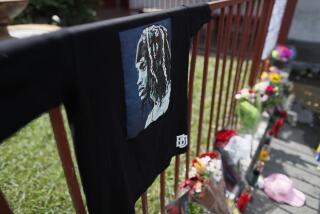Man gets 22 years in murder of father
- Share via
Combing through burned debris, firefighters at a vacant Crenshaw storefront made a gruesome discovery: the charred hands, feet and head of a man stuffed inside a small refrigerator.
The remains belonged to Wayne Taylor Jr., 65, a long-retired computer programmer whose family had reported him missing a week earlier.
As Los Angeles Police homicide detectives delved deeper into the victim’s background, they say they discovered that Taylor had spent the final few weeks of his life living in fear of his increasingly erratic and violent adult son, Wayne “Trea” Taylor III.
The elder Taylor told others that his son had recently assaulted him, leaving him with black eyes and a broken nose. He told his landlord that his son had threatened to kill him if he called police. And in what detectives described as part of his final entry in a journal, Taylor wrote: “Trea called and asked if I wanted to come out and talk with him. I told him no.”
In a downtown L.A. courtroom Monday, Superior Court Judge Stephen A. Marcus sentenced the younger Taylor to 22 years and eight months to life in prison for the murder of his father, saying the crime involved “a high degree of cruelty.”
“I have to conclude that this defendant snapped in this situation . . . because there’s no other explanation for this level of violence,” Marcus said.
During an at-times bizarre sentencing hearing, Taylor, 38, remained in a nearby cell after refusing to enter the courtroom. At one point, Marcus visited his cell in an effort to persuade him to attend his sentencing. The judge said Taylor would not respond and instead invoked the name of Haile Selassie, the late Ethiopian emperor whom Rastafarians worship as an incarnation of God.
An audio system was set up to allow Taylor to hear the proceeding in his cell. But he could be heard chanting and singing loudly throughout the 45-minute hearing.
Friends and relatives sent the judge letters pleading for leniency, noting that Taylor had been a successful student at Morehouse College in Georgia and a devoted member of a local church. Several described him as a loving father who helped care around the clock for a daughter born prematurely and who died a day short of her first birthday in June 2006.
“I believe he deserves to have another chance,” his mother, Fannie Taylor, told the judge. She had been divorced from the victim since 1978.
During the trial last year, Deputy Dist. Atty. Bobby Grace argued that the roots of the killing lay in events that had taken place several months before the victim went missing in November 2007.
Three months earlier, Taylor’s mother-in-law had been granted a restraining order to remove her son-in-law from her home, where he had been living with his wife for about six months. In the court records, Alline Merchant-Dymakkus said Taylor had made sexual comments to her and cornered her in the house while he was naked and holding his genitals.
“I fear for my life,” she wrote.
But Taylor refused to leave, and sheriff’s deputies arrested him on Sept. 4, 2007. He remained in jail for more than three weeks until his mother bailed him out.
Prosecutors alleged that Taylor was furious that his father had not intervened to free him sooner and confronted him. The beating was so severe, Grace said, that the attack left the elder Taylor with a displaced lens in his left eye.
The victim told several people that his son was responsible and that he had also stolen a laptop computer and $23,000. A day after the attack, prosecutors said, Taylor, who had been homeless and penniless, was able to pay $10,000 in cash to rent a storefront on Crenshaw Boulevard. Police later found his father’s laptop there.
The younger Taylor’s first wife mentioned the assault in court papers she filed seeking to restrict her ex-husband’s access to their son in an ongoing custody dispute, according to court records. Grace said the move enraged Taylor and led to the killing.
The victim was last heard from on Nov. 21, 2007. His remains were discovered four weeks later.
Grace acknowledged that the case against Taylor was largely circumstantial. But he also pointed to a possible match between a Nike tennis shoe belonging to the defendant and a shoe-print found outside near the Crenshaw store where the victim’s remains were found. A spot of blood found on the shoe matched the victim’s.
But Deputy Alternate Public Defender Gerald P. Williams argued in court that prosecutors relied too heavily on a possible motive because their evidence against his client was thin. The blood on the shoe could have come from the prior assault, he said, noting that many people wear similar sneakers.
“I’m hopeful that the appellate courts will take a close look at this,” Williams said after Monday’s hearing.
--
More to Read
Sign up for Essential California
The most important California stories and recommendations in your inbox every morning.
You may occasionally receive promotional content from the Los Angeles Times.














